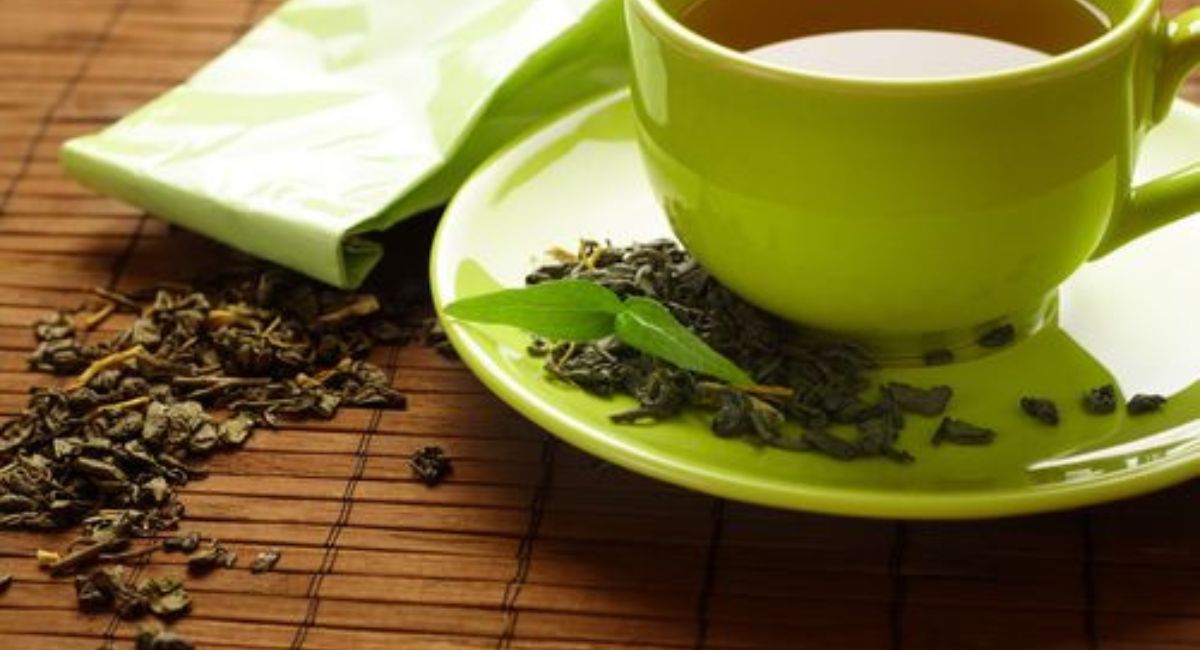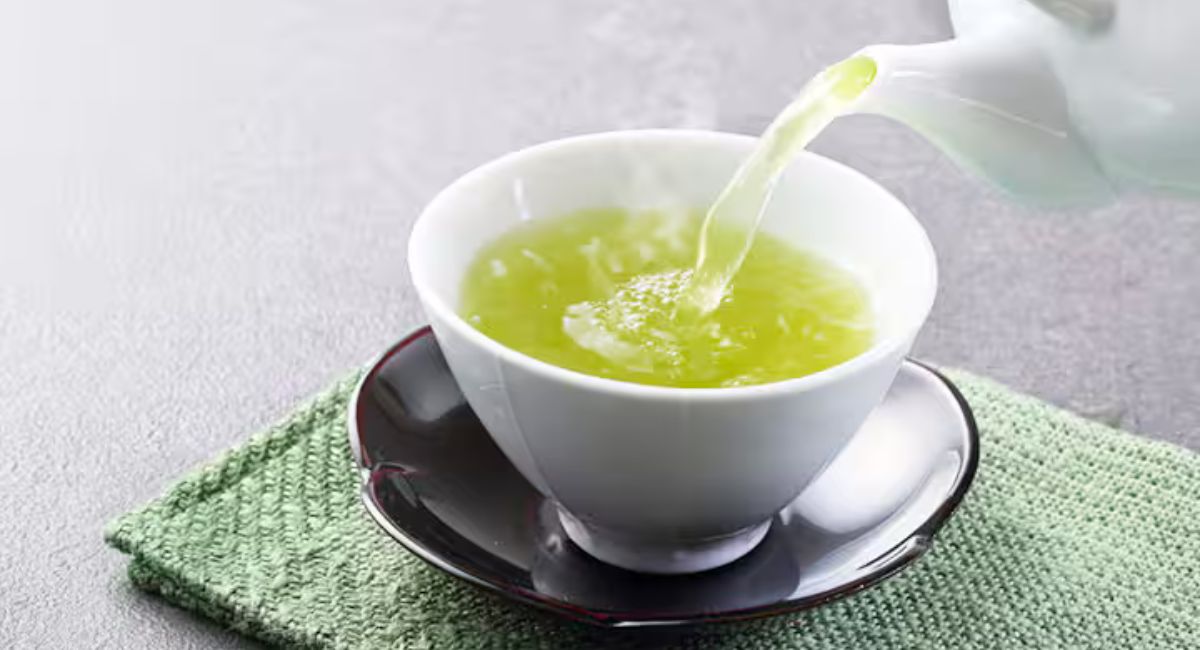Ever sat in bed wondering, “Is it healthy to drink green tea before bed?” You’re not alone. Many people grab a warm mug at night hoping for calm, only to worry later if the caffeine will ruin their sleep. It’s confusing, because green tea has such a wholesome image yet nobody wants to toss and turn after a “healthy” drink.
This post clears up that confusion. You’ll discover whether green tea at night really helps you relax or if it’s better saved for mornings. We’ll look at benefits, possible side effects, and simple ways to make nighttime tea work for your body so you can sip with confidence.
Why People Choose Green Tea Before Bed
People often pick green tea at night because it feels soothing. They want a bedtime beverage alternative that isn’t coffee. Green tea has a long tradition of helping people unwind. It brings a relaxation response thanks to L-theanine (sleep-promoting amino acid) which calms the mind while avoiding heavy alcohol or sugary drinks. The mild taste of green tea and the ritual of sipping something warm support mental rest and reduce evening nerves.
Another reason many prefer green tea before sleeping is because of its green tea antioxidants at night. These catechins (antioxidants in green tea) help fight antioxidants and free radicals created during daily stress. People also believe green tea supports green tea for better sleep thanks to compounds that may boost rest without strong side effects. Some even use decaf versions to enjoy taste without green tea caffeine content.

Health Benefits of Drinking Green Tea at Night
Green tea supplies compounds that can help the body while you rest. The blend of catechins (antioxidants in green tea) and L-theanine (sleep-promoting amino acid) works to reduce inflammation, support heart health, and help wounds heal. Research suggests that antioxidants in green tea may assist in lowering certain risk factors for chronic disease when consumed in moderate amounts. Moreover, green tea at night may favor a metabolism boost overnight helping with maintenance of healthy weight.
People who adopt this habit often note improvements in sleep rhythms. Green tea helps signal to the brain that it is time to wind down, aligning with the circadian rhythm (sleep cycle). As a result, many experience green tea bedtime effects like falling asleep faster and lighter evening calm. Also, for those aiming for green tea weight loss before bed, studies show that certain compounds may enhance fat oxidation when combined with good diet and exercise.
How Green Tea Affects Sleep and Relaxation
Green tea contains green tea caffeine content, though often less than coffee or black tea. That caffeine can heighten alertness, sometimes interfering with restful sleep if consumed too close to bedtime. But the calming impact of L-theanine (sleep-promoting amino acid) counterbalances some stimulation by promoting waves of relaxation in the brain. When matched with the body’s internal clock, green tea can support sleep instead of disturbing it.
Another factor is how green tea interacts with your nervous system calming effects. Its combination of mild caffeine and calming compounds can soothe racing thoughts and reduce anxiety. You may feel more relaxed thanks to herbal infusions style blending, like mixing green tea with chamomile or mint. But people with caffeine sensitivity might find even a little green tea at night gives them restless sleep or vivid dreams.
Possible Side Effects or Risks of Green Tea Before Bed
Though many enjoy green tea in the evening, there are risks for some. One common issue is that caffeine in green tea can trigger mild insomnia or frequent waking. Those with caffeine sensitivity may experience fast heartbeat or jitteriness. Also, green tea tends to increase the need to urinate, which can interrupt sleep cycles and reduce rest quality.
Another worry lies in how green tea may influence your digestive system impact. Drinking green tea before bed can cause stomach discomfort, acid reflux, or digestive upset in people with sensitive digestion. If your stomach is empty, green tea may irritate. Also, drinking any fluid late in the evening risks nighttime trips to the bathroom, which fragment sleep.
Best Time and Way to Drink Green Tea at Night

If you choose to enjoy green tea before bed, timing matters. For most people, finishing a cup at least 45–60 minutes before lying down gives the body time to process caffeine and reduces disruption to sleep. Using decaffeinated green tea helps; it lets you enjoy the flavor and many benefits while avoiding strong caffeine effects.
The way you brew green tea influences its effects too. Steeping too hot or too long increases caffeine and bitterness. A gentle brew—lower temperature, shorter time—preserves delicate compounds like catechins (antioxidants in green tea) without overcooking them. Also choose moderate serving sizes; large volumes close to bedtime may cause hydration before bedtime overload and unwanted bathroom trips.
Choosing the Right Type of Green Tea for Nighttime
To get green tea bedtime effects without trouble, pick a tea variety that suits your needs. Decaffeinated green tea offers many of the health advantages with minimal stimulation. Organic loose-leaf tea often contains fewer additives. Some blends combine green tea with herbs to reduce caffeine tone.
Herbal pairings can help too. Chamomile, lavender, lemon balm (alternative teas) used along with green tea make a gentler beverage. These herbs bring soothing aromas and sedation. Also look for teas labeled specifically for sleep or relaxation. Avoid tea with strong flavorings or high caffeine blends if drink late. A clean, quality tea is best green tea for sleep.
Green Tea and Weight Management While You Sleep
Green tea before bed may help with weight goals when paired with healthy eating and activity. During the night, your resting metabolic rate remains active. Some studies suggest that green tea can enhance fat burning during rest due to its metabolism boost overnight while you sleep. That effect is stronger with compounds like catechins (antioxidants in green tea).
Still, green tea alone does not work magic. If you eat heavily late at night or skip exercise, benefits shrink. Better weight management comes from whole habit change: eating earlier, staying active, and keeping consistent sleep. Green tea can be a supportive component of a routine that treats sleep and metabolic health as connected.
Signs Green Tea at Night May Not Suit You
You might find green tea before sleeping causes more harm than help if you notice certain symptoms. If you feel restless, your heart races, or you toss and turn, you could be reacting to caffeine. Also, if you wake multiple times to use the bathroom, that may signal hydration before bedtime was too much. Discomfort in the stomach or acid reflux points to digestive system impact not handled well.
Specific groups should be especially careful. People who are pregnant, children, those with insomnia, anxiety disorders, or sensitive stomachs may need to avoid green tea before bed. Also, those with heart conditions or already on stimulants should consult a doctor. When risks outweigh benefits, staying away or using decaffeinated green tea or herbal options is smarter.
Natural Alternatives and Herbal Pairings for Better Sleep
Sometimes green tea isn’t the best choice. Herbal teas for sleep like chamomile, lavender, or lemon balm deliver calming effects without caffeine. Many people in the USA combine green tea with ayurvedic remedies for sleep, mixing herbal infusion bursts with green tea or replacing it entirely for better rest.
Creating calming teas for evening works well. A mix of warm water, a spoon of decaf tea or herbal infusion, maybe a slice of ginger or mint, brings gentle warmth and relaxation. You enjoy the aroma, warmth, and ritual without strong stimulants. These alternatives often cause fewer side effects of green tea before bed, especially for delicate sleepers.

Expert Tips to Build a Healthy Evening Tea Routine
To make green tea part of a soothing bedtime pattern, consistency helps. Experts advise keeping a regular wind-down schedule, using warm lighting, avoiding screens, and stopping heavy eating at least an hour before bed. Green tea can become the signal that the day is ending, helping your body settle into rest.
Also consider small habits that support your sleep. Keeping your bedroom cool, limiting fluid intake an hour before bed, and using gentle stretching or reading alongside tea all strengthen rest. Pairing green tea with mindfulness, comfortable clothing, and calm surroundings enhances its positive effects and reduces risks.
FAQs About Is It Healthy to Drink Green Tea Before Bed?
Q1: Does green tea help you sleep?
Not directly. It contains L-theanine, which promotes relaxation, but the caffeine can offset that effect.
Q2: How late is too late to drink green tea?
If you’re sensitive to caffeine, avoid it after 4–6 PM. Some people can tolerate it as late as 8–9 PM.
Q3: Is decaf green tea still healthy?
Yes. It retains most antioxidants and calming compounds while removing most caffeine.
Q4: Can green tea cause nightmares?
Unlikely. But if it disrupts your sleep cycles, it might make dreams feel more vivid.
Q5: Is matcha worse before bed than regular green tea?
Yes—matcha contains more caffeine (up to 70 mg per serving). Better for mornings or early afternoons.
Q6: What about iced green tea before bed?
Iced tea has the same caffeine and diuretic effect. Cold beverages might also feel less relaxing before sleep.
Q7: Can green tea help with overnight weight loss?
It can slightly boost metabolism, but don’t expect major effects. Consistency matters more than timing.
Q8: Should I drink green tea before or after brushing my teeth at night?
It’s better before brushing, to avoid tannin stains and acid exposure overnight.
Final Thoughts
Deciding whether drinking green tea before bed is healthy depends on your body, habits, and sensitivity. For many, green tea for better sleep brings soothing effects, helpful antioxidants, and even mild metabolic advantages. On the other hand, caffeine in green tea or over-hydration may disturb sleep for some.
If you try it, go with small, gentle steps: choose decaffeinated green tea, drink moderately well before lying down, and notice how you feel. If your sleep stays good, your digestion stays calm, and you rest well, green tea before bed can be a healthy habit. If not, alternatives like herbal teas or simply warm water might serve you better.

